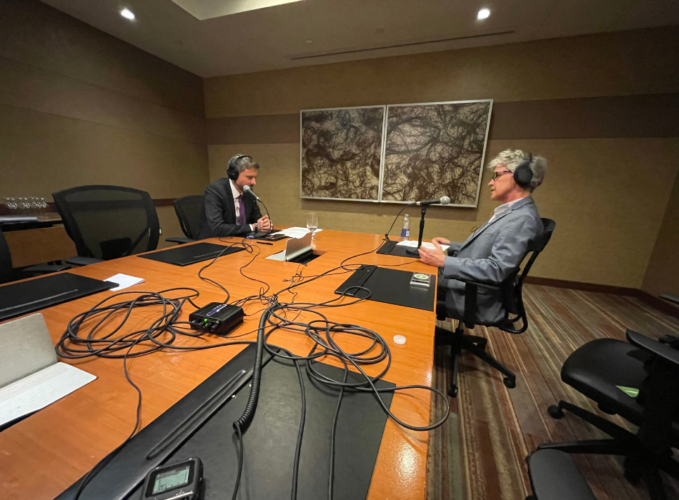Farm Radio International’s Executive Director, Kevin Perkins, recently spoke with the president of the International Fund for Agricultural Development (IFAD), Alvaro Lario. Mr. Lario was in Ottawa during his first visit to Canada. They spoke about how IFAD is supporting small-scale farmers, how climate change is affecting farmers, and how IFAD is engaging communities in finding solutions to the big challenges they face. The following is an edited, abridged transcript of their conversation.
KP: What are some of the strategies and investments that IFAD is pursuing to help boost the productivity and income of small-scale farmers to improve their resilience to climate change and improve nutrition?
AL: First of all, it is important to understand that investing in small-scale farmers makes a lot of economic, political, and environmental sense. Small-scale farmers have the potential to lift millions of people out of poverty and hunger. We know that investment in agriculture is estimated to be at least two or three times more effective in reducing poverty than investing in other sectors. Today, with climate change, biodiversity extinction, economic shocks, and rising conflicts, we know that these are extraordinary times. We need to invest now in this structural change that can end hunger and extreme poverty. It’s not acceptable that three billion people cannot access nutritious food or that 80% of the world’s poorest people live in rural areas.
KP: How is IFAD working to help farmers adapt and even find ways to thrive and improve their food security in the face of a hotter, drier, more turbulent, and disaster-prone climate?
AL: We know small-scale farmers are at the frontlines of climate change. They live in some of the most vulnerable landscapes, such as hillsides {and] floodplains, and they rely on fragile natural resources to make a living. As a result … rising temperatures, erratic rainfall, pest infestations, rising sea levels, [and] extreme weather events are threatening their lives and their livelihoods. When I meet many of the heads of state in Africa, in addition to food systems, what they’re really worried about is how they can mobilize further financing to support how rural communities can adapt to these climate-extreme weather events.
This is why we need to build resilience to the shocks today so that there will be enough food these farmers can produce to feed the planet tomorrow. We know that extreme weather events will become more frequent. We’re seeing it every day in our lives, and we are also seeing that biodiversity is on the brink of extinction. That’s why global food systems are becoming more and more fragile. We need to make sure that we build this local resilience, supporting small farmers and ensuring that local production and well-functioning markets are in place.
Generally at IFAD, 100% of our finance projects are designed and assessed looking at climate vulnerability. And of every dollar that we invest in countries, 40 cents goes to climate-sensitive projects and to climate activities. It’s important to support small-scale farmers. They’re really at the forefront of climate change.
KP: There are many changes confronting small-scale farmers: climate change, changes in the global marketplace, and so forth. As a result, new farming methods, technologies, [and] adaptation practices need to be put into place by small-scale farmers. These new practices and methods are information- and knowledge-intensive. Yet, relevant and timely, useful information can be hard to come by. At Farm Radio, we talk about information poverty as a barrier to the success of small-scale farming. Is IFAD making investments to help with the delivery and provision of information, especially for women in rural areas?
AL: Working with partners like Farm Radio International can help us reach many of the small-scale farmers you were talking about, particularly women and young people, with timely, useful information that they can use in their practices. For us, empowering women, tackling gender inequality, and building women’s resilience to shocks is a key priority. There are around 1.7 billion women and girls that live in rural areas. That is one-fifth of humanity, and on almost every gender indicator, rural women are far worse off than rural men. In particular, they carry a disproportionate burden of malnutrition, especially during reproductive age. So it’s important that we invest in women and also in girls.
We need to help them access tools, inputs, skills, and also develop their capacity through information so that they can participate in the decisions in their household and in their communities. Despite being major contributors to these economies, we still see that women lack access to productive assets like land or many of the inputs that are necessary. If we manage to close the gender gap in farm productivity, there are estimates that agrifood systems could increase global GDP by even 1%, that is $1 trillion. So I think we really need to invest in women.
Click here to listen to a full version of this interview.
________________________
This story was originally published in Barza Wire and on the Farm Radio International website.

